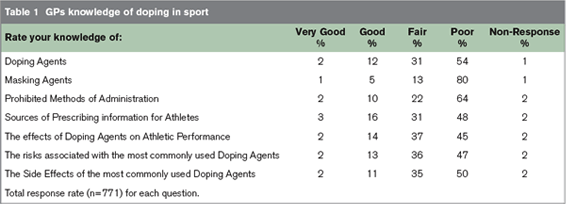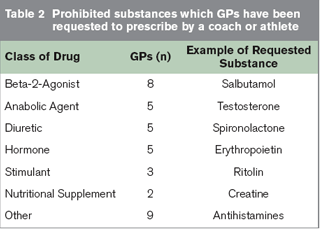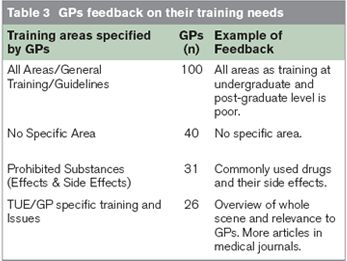CB Woods, A Moynihan
School of Health and Human Performance, Dublin City University, Dublin 9
Abstract
This study examined General Practitioner’s (GP) knowledge, practice and training requirements in relation to doping in sport in Ireland. All 2,083 GPs on the Irish College of General Practitioners (ICGP) register received a postal questionnaire, yielding a 37% response rate (N=771, 63% male, average age 46.2 ± 9SD, range 28-74 years). Results revealed that 14% (112) deemed their knowledge of doping agents to be good or very good, 12% (94) had completed specific training modules in doping or sport, and 24% (183) were connected with a specific sport as a team doctor/advisor. Over one in four (28%: 217) had been consulted for advice on doping in Sport, 33% (256) possessed the current list of prohibited substances, and 25% (190) knew of the Irish Sports Council’s drug-testing procedures. The current initiatives to discourage doping in sport were felt to be ineffective, and although 92% (716) indicated that GPs had a role to play in the prevention of doping in sport, only 9% (66) felt adequately trained for such a role. There was overwhelming support for further training among GPs, although the most appropriate method of providing training is complex and requires strategic planning.
Introduction
The task of tackling doping and drug abuse in sport has faced sporting authorities since anabolic steroids appeared in bodybuilders and weightlifters and amphetamines and other stimulants emerged post–World War II1. The International Olympic Council (IOC) published its first list of doping classes in 19762, and the World Anti-Doping Authority (WADA) was founded in 1999, leading to the adoption of The World Anti-Doping Code (“WADA Code”) in 2003.3 There are five classes of substances banned by the IOC: stimulants (e.g. amphetamines), narcotics, anabolic agents (e.g. steroids), diuretics, and peptide hormones (e.g. growth hormone or erythropoietin)4 Originally stimulants and anabolic steroids, readily detectable through standard urine sampling, were the drug of choice. However athletes now also use endogenous substances such as blood doping and the application of recombinant peptide hormones, such as erythropoietin, which are much more difficult to detect.5 To combat adaptation to the anti-doping procedures, there is a constant need for research and development to improve strategies of doping control.
The formation of the Irish Sports Council (ISC) in July 1999 saw the establishment of the first Irish anti-doping programme and a dedicated Anti-Doping Unit (ADU). Although drug testing is a priority of the ADU, they are also committed to the education of all major stakeholders involved in doping and sport.7 Two such stakeholders are General Practitioners (GPs) and athletes. Previous research has emphasised that ‘tackling drug abuse in sport [in Ireland] requires education of both athletes and doctors’.8 In 2006, the ADU conducted a survey to examine the knowledge and current practice of Irish GPs in relation to doping in sport, and to determine their training requirements. The purpose of this paper is to present the findings of this survey.
Methods
A two-page, 20-item questionnaire based on work by Laure and colleagues and developed by the ISC in consultation with the Irish College of General Practitioners (ICGP) was delivered to all 2,083 GPs on the ICGP register in March 2006. A cover letter explained the purpose of the study and ensured confidentiality. Participation in the study was voluntary; a pre-paid envelope and random follow-up calls were used to maximise response rate. Data are presented as means, standard deviations and proportions where appropriate. The Pearson Chi square statistic was used to determine the relation between gender, affiliation with a sports team or impact of further training in sports medicine on knowledge or current practice. All qualitative data from the openended questions was recorded verbatim and then content analysed to reveal the main recurring themes.
Results
Demographics A 37% (N=771) response rate was achieved and all counties were represented. The average age was 46.2 years (± 9.25; range 28-74 years), 62% (N=484) were male. Twelve percent (n=94; 80% males) had completed specific modules in doping or sport. Twenty four percent (n=183; 87% males) said that they were currently connected with a specific sport as a team doctor or advisor.
Knowledge
GPs rated their knowledge of seven specific areas related todoping and sport (Table 1). Male GPs rated their knowledge higher than their female counterparts (p<0.01). GPs who had completed specific modules in doping or sports related area indicated a greater knowledge than those who had not completed such modules (p<0.01). Team doctors or advisors possessed significantly greater knowledge than their non-affiliated counterparts on all seven areas (p<0.01).

GPs felt that the Internet was the most likely source of prohibited drugs for athletes (96% agreed) in Ireland. This was followed by team members / friends (94%), drug dealers (84%), family members (77%), doctors (58%) and pharmacists (55%). Thirty three percent (256) of GPs possessed the current list of substances prohibited in sport. Twenty percent (154) were aware of ISC resources available to combat the fight against drugs in sport, and 25% (190) knew of ISC drug testing procedures. A high proportion (56%; 434) felt that the current ISC initiatives to discourage doping in sport were ineffective, with only one in four indicating that current procedures were effective. Male, as opposed to female GPs, GPs who had completed further training in doping or sport, and those affiliated with as a team doctors / advisor were more likely to possess the current list of substances prohibited in sport, and to regard current initiatives to discourage doping in sport as effective than their colleagues (p<0.05).
Current Practice
Twenty-Eight percent (217) confirmed that they had previously been consulted for advice on doping. Respondents, who may have been consulted on more than one occasion, listed advice on areas such as nutritional supplementation (162), particular banned substances (130), the list of prohibited substances (95), the health risks of doping (84), anti-doping regulations (59), the side effects of doping (57) and others (16). Twelve percent of GPs (89) indicated that they had received a request for anabolic steroids from a coach or an athlete without medical indications and a further 6% (44) had received requests for other prohibited substances without medical indications. The most commonly requested classes of drugs, along with examples of the requested substance are listed on Table 2.
 |
GPs were asked if they had ever prescribed medication for what they may have deemed legitimate medical reasons, but had subsequently felt that the substance was in actual fact used by an athlete to improve sporting performance. Results show that 3% (26) of GPs had felt this way, most often when prescribing beta-2- agonists and anabolic agents. In the event of an athlete insisting on taking a prohibited substance, 90% (690) said that they would discourage the use of the substance in all circumstances, while 2% (13) confirmed that they would prescribe or supply the requested agent; the remaining respondents chose not to answer this question. Ten percent (77) said they would be willing to monitor the athlete during use of the substance and 27% (208) declared that they would refer the athlete to another doctor for a prescription or monitoring. One percent of GPs (6) deemed it acceptable for doctors to prescribe anabolic steroids for nonmedical indications. Male GPs, GPs who had completed further training in doping or sport, and team doctors/advisors were more likely to have been consulted for advice on doping than their colleagues. However gender, training status, nor affiliation to a sport as a team doctor/advisor proved divisive in terms of practice.
Health Professionals and the Future
Ninety-two percent (716) felt that GPs and pharmacists have a role to play in the prevention of doping in sport. Despite this, only 9% (66) felt adequately trained for such a role. Eighty-six percent (657) felt that they required further training in relation to doping issues with general training, overviews and guidelines as the most commonly requested training topics (Table 3).

GPs (12%; 96) who felt that they didn’t require further training in relation to doping issues, indicated that their investing time in such training would be disproportionate to the number of consultations which they have with athletes. Thus, they considered training on doping as low priority. Others stated that they had no interest or cited time constraints as a reason for not requiring further training.
Discussion
A discrepancy existed between the proportion of GPs who had completed specific training on doping or sport (12%) and those who were connected with a sport, as either a team doctor or advisor (24%). The knowledge levels of Irish GPs of doping in sport were relatively poor. This finding is similar to previous research.8-10 The majority of GPs indicated that, in the event of an athlete approaching them requesting a prohibited substance, they would discourage the use of the substance in all circumstances. Neither gender, training status nor involvement in sport proved divisive in this issue, indicating a high level of approval for acting in accordance with principles of best practice and due professionalism. Thirty-three percent of GPs indicated that they had a copy of the current list of substances prohibited in sport; this compares poorly with France where 73% of respondents to a similar survey possessed such a list.10 In Ireland, 28% of GPs had in the past year been consulted for advice on doping; this compares favourably with France (approximately 37%10), but unfavourably with both the Netherlands9, and in Senegal11 where it was estimated at 18%. Male GPs, sport educated or sport involved GPs were significantly more likely to have been consulted for advice on doping, and to have received requests for nonmedically indicated anabolic steroids.
Similar to previous research, a small number of GPs said that they would supply the requested agent.9 The 3% of GPs who had felt that medication which they may have prescribed for legitimatereasons was in fact used by an athlete to improve sporting performance compares favourably to France where 14% of GPs expressed similar sentiments.10 One percent felt it neither unethical nor unprofessional to prescribe anabolic steroids to athletes without medical indications and stated that such a practice was acceptable behaviour. A further 1% didn’t answer or didn’t know if such a practice was acceptable or not. Although combining both only accounts for 17 GPs of the 771 surveyed, there is a need for a zero tolerance approach. Most GPs (90%) felt that both they and pharmacists had a role to play in the prevention of doping in sport however; only 9% felt that they were adequately trained for this role. In France and the Netherlands similar proportions, 89% and 70% respectively, felt that they had a role in doping prevention; however, significantly higher proportions 27%, and 30% respectively felt they had adequate training.9,10 Dutch GPs indicated that their preferred means of increasing knowledge in this area was by short and practical reviews.9
In summary, Irish GPs have poor knowledge of doping in sport which is consistent with their European colleagues. This is worrying since Irish GPs are consulted about doping or drugs in sport. There is a need for enhanced opportunities for GPs to avail of additional sport specific training. However, a strategic approach to this training is required; one that considers the sentiments of those who indicated that further training would not be a priority due to the relatively few consultations required. The main policy question arising from this research is whether resources would be best allocated towards the education of GPs already involved in sport. These individuals are already relatively knowledgeable and most likely to be regularly consulted. Or do you offer education to the GP population at large; these individuals are not as knowledgeable and are consulted less frequently.
References
- Verroken M. Drug use and abuse in sport. Bailliere’s Clinical Endocrinology and Metabolism 2000;14:1-23.
- Mottram D. Banned Drugs in Sport: Does the International Olympic Committee (IOC) List Need Updating? Sports Med 1999;27:1-10.
- Orchard J, Fricker P, White S, Burke L, Healy D. The use and misuse of performance-enhancing substances in sport. MJA 2006;184:132-6.
- Jenkins P. Doping in Sport. The Lancet 2002;360:99-100.
- Birkeland K, Hemmersbach P. The Future of Doping Control in Athletes: Issues Related to Blood Doping. Sports Med 1999;28:25-33.
- Irish Sports Council. Building Sport for Life: The Irish Sports Council’s Strategy 2006-2008. Dublin 2006.
- Anti Doping Unit. Annual Report of the Anti-Doping Unit of the Irish Sports Council for 2005. Irish Sports Council, Dublin 2006.
- Greenway P, Greenway M. General practitioner knowledge of prohibited substances in sport. Br J Sports Med 1997;31:129-31.
- Hartgens F, G.Rietjens S, van Haren T, Vogels E, Vrijman. Huisarts en Doping (GPs and Doping). In Rotterdam, Nederlands Centrum voor Dopingvraagstukken/ TNO-PG.1998.
- Laure P, Binsinger C, Lecerf T. General practitioners and doping in sport: attitudes and experience. Br J Sports Med 2003;37:335-8.
- Dieye A, Diallo B, Fall A, Ndiaye M, Cisse F, Faye B. Doctors belonging to the Senegalese Association of Sport Medicine and doping in sports: survey on knowledge and attitudes. Sante 2005;15:167-70.